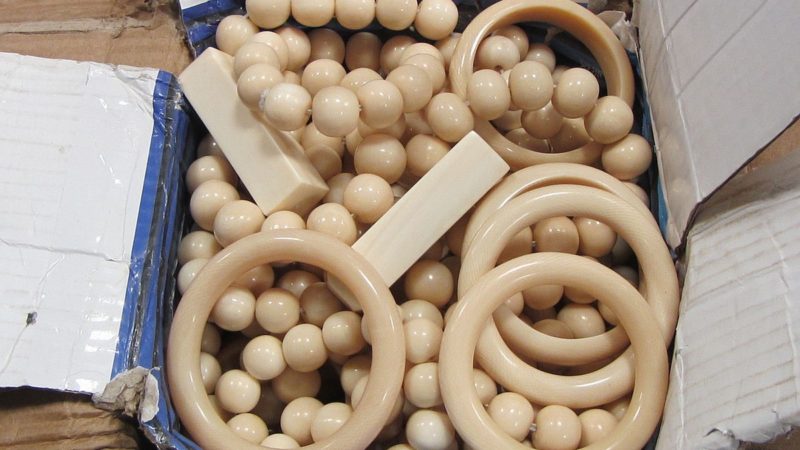There are other elephants in the room when it comes to animal rights.

Pic: Ivory seized at Heathrow (Wikimedia Commons).
After years of campaigning from animal rights and conservation groups, the government have finally announced that the sale of ivory will be banned in the UK.
The proposals outlined by Environment Secretary Michael Gove will ban the trade of almost all items containing ivory. Indeed, the ban makes exemptions for only musical instruments made prior to 1975 with less than 20% ivory content, some rare and important antiques, and museum objects. Offenders caught dealing in ivory may be landed with an unlimited fine or up to five years in jail.
The new ban comes after over 70,000 people responded to a government consultation, of which over 88% were supportive of the proposed ban. This is unsurprising given that a recent YouGov poll found an overwhelming 95% of people in the UK would never purchase ivory, even if it was ‘antique’.
This represents a significant strengthening of the UK’s previous restrictions on the ivory trade, which were riddled with loopholes. Whilst the trade in raw ivory has been illegal since 1989, buying and selling ivory products made before 1947 has remained legal.
These measures were supposed to end the demand for newly-harvested ivory, thereby reducing the incentives for elephant poaching in Africa, but have been largely pointless. Authenticating older ivory is an expensive practice, and the government has not been able to afford the technology needed to accurately date ivory. Traffickers have therefore had little trouble laundering new ivory into the market.
Consequently, the UK ivory trade has been booming. A study of records under the Convention on International Trade in Endangered Species (CITES) has suggested that between 2010 and 2015 Britain was the largest exporter of legal ivory in the world. Domestically, illegal ivory is openly traded on internet auction and social media sites on a daily basis, as regulators have no means of determining when it was produced.
Considering the plight of the African elephant, it’s remarkable that it has taken this long for such a ban to be put in place. The clock is ticking for these magnificent animals, and their survival lies in the balance.
The facts are clear: in 1979, it was estimated that there were 1.3 million elephants in Africa. That figure has dropped to approximately 415,000 today. According to the Born Free Foundation, the number of savannah elephants declined by 30% from 2007 to 2014, and the number of forest elephants by 60% from 2002 to 2011.
If current levels of poaching persist, the African elephant will be extinct in 20 years. The UK will no longer be playing a role in this, even if such a ban has been a long time coming. But this ivory ban raises more questions.
Michael Gove is right to say that the ivory trade is ‘abhorrent’. But so is the exploitation and killing of all animals for the purposes of fashion. If Gove is truly progressive on animal welfare, surely he must now take steps to tackle the cruelty of the fur and leather industries.
Fur farming has been illegal in the UK since 2000, but we still contribute to vast animal suffering through wearing fur. Indeed, the UK imported almost £75 million of fur last year.
Labour has recently pledged to ban all fur imports into the UK. The government should follow suit.
Leather production is more difficult to tackle. On average, a single consumer will have at least four leather items on them at any one time, which usually consists of their shoes, belt, wallet and watch-strap. The British leather industry is large and powerful, and banning the trade of leather in all forms isn’t currently feasible.
But the government could still take a number of smaller steps to start phasing out leather: banning the slaughter of any animal solely for its hide (whilst still allowing leather production from the hide of animals killed for meat), banning the import of leather from endangered species, and imposing greater taxes on leather products.
Perhaps the ivory ban will go beyond what it sets out to do: to kick start a process where all of us realise animals do not exist purely to make nice coats, bags and ornaments – and that if we continue harvesting ivory, fur and leather, we will be pushing many species to the brink.
Joshua Myers is a Bath student and animal rights campaigner.
To reach hundreds of thousands of new readers we need to grow our donor base substantially.
That's why in 2024, we are seeking to generate 150 additional regular donors to support Left Foot Forward's work.
We still need another 117 people to donate to hit the target. You can help. Donate today.



